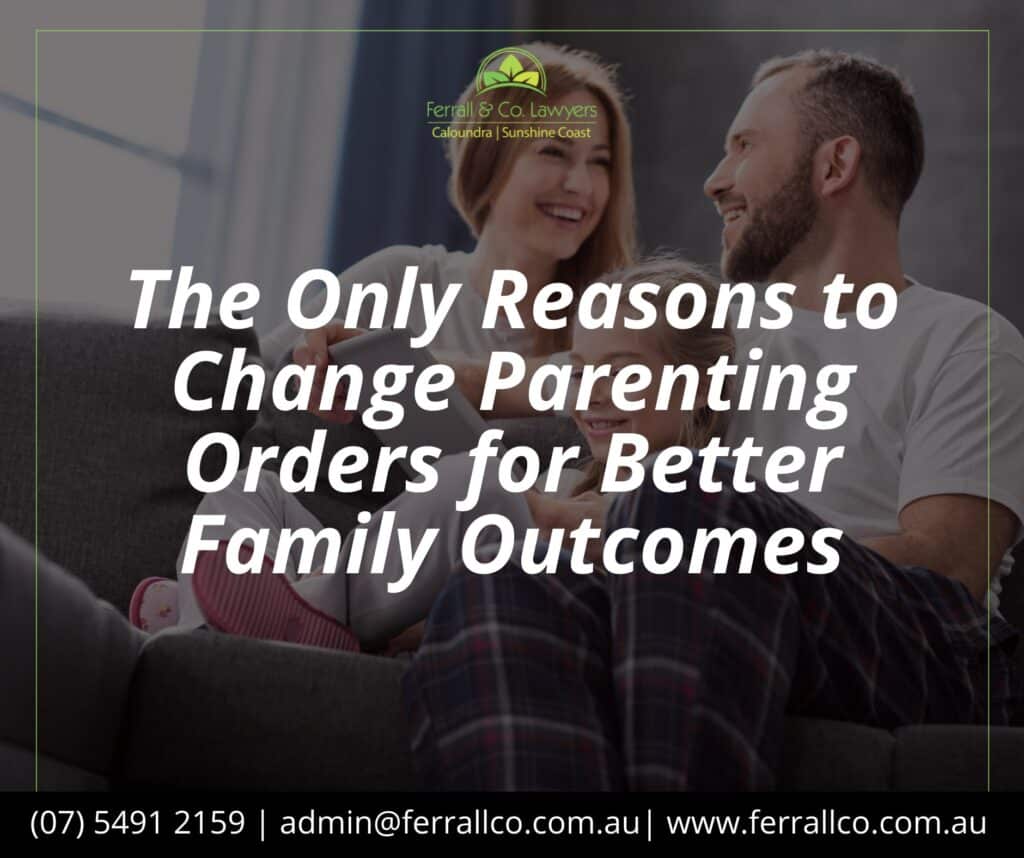
Can you change a parenting order? Yes. Despite parenting orders being considered ‘final’, there are valid reasons to change parenting orders, such as a significant change in circumstances, concerns about the safety or wellbeing of the child, one parent relocating, or the child’s needs and preferences evolving with age. That doesn’t mean parties can approach court orders frivolously. The Family Court wants parents to consider the potential impact on the child before taking such a serious step. There’s a process clients need to follow to develop final parenting orders that best suit their current needs.
Key takeaways

Why change existing parenting orders?
There are two contexts in which parties can vary an existing parenting order: by consent or litigation.
Consent
It’s easiest to approach parenting arrangements consensually. If both parents recognise the need to make a change to existing circumstances, they can apply for consent orders. A parenting plan can be submitted to the Court to be made into a consent order.
If you’re struggling to reach an agreement regarding parenting arrangements, attending mediation with the other parent is a valuable step. An experienced mediator can guide both parties through family dispute resolution, focusing on the best interests of the child. This process helps address issues related to parenting orders, including amending an existing parenting order or establishing new terms under family law. Mediation offers a constructive path forward, often reducing the need for further involvement in the family court.
Litigation in Family court
Over 95% of parents organise parenting matters without involving the Court, often establishing clear parenting orders or mutual agreements regarding living arrangements for their children. However, reaching an agreement isn’t always possible. In such cases, parents may need to seek a final parenting order through the Court, though litigation remains a last resort.
The Court follows clear guidelines when varying orders. It uses the idea of a ‘significant change in circumstances’. That raises one question: What is a significant change? The Court uses the 1979 decision in Rice v Asplund.

Rice v Asplund test
In family law, the Rice v Asplund decision provided a precedent for when the Court will consider variations to a parenting order. Section 65DAAA of the Family Law Act covers this stipulation.
Do the parties consent to the change? If so, Rice v Asplund won’t apply. Yet another reason why consent is useful. Consent grants flexibility. Why empower the Court to make the decision?
The Court may or may not accept changes to existing parenting orders. However, the Court isn’t completely unpredictable. Some circumstances carry greater weight than others. Such circumstances may include:
Relocation. One parent may wish to relocate with the child, impacting the other parent’s ability to maintain a meaningful relationship. Without a formal agreement, it can be hard to enforce compliance, requiring the opposing parent to present evidence showing how the move affects the child’s welfare.
Lack of information. There may have been crucial information missing from the previous hearing.
New relationships. Re-partnering has significantly altered the living arrangements of one or both parents.
Domestic violence. There are concerns about the child experiencing or being exposed to family violence.
Health concerns. A parent or the child has developed a chronic medical issue and fallen into ill-health.

How to change a parenting order
These are the essential steps for parties to change a parenting order.
Consult with each other
One parent may feel that changes are necessary due to changed circumstances that affect the child’s welfare. In such cases, it’s important to approach the other parent first and try to find agreement through open communication.
Establishing clear communication guidelines can help facilitate a constructive discussion. However, this step requires careful consideration and is not appropriate if there are concerns about substance abuse, unsuitable care arrangements, an informal arrangement, or if the circumstances affect the child’s developmental needs, safety, or well-being.
Seek legal advice
An experienced family lawyer is always recommended when navigating complex parenting orders or parents seeking to establish final parenting orders. If there has been a significant change in circumstances, such as significant health issues affecting the child or a parent, a lawyer can assist in developing a revised plan that meets the requirements of the Federal Circuit Court.
Their expertise ensures that the proposed arrangements align with legal standards, consider the children’s developmental needs, and assess the suitability of the existing arrangement, always focusing on the primary consideration: the best interests of the child.
Use mediation
Attending mediation allows parents to focus on the best interests of the child while resolving disputes constructively. A mediator enables parties to discuss and agree on appropriate arrangements, such as developing a parenting plan, modifying an earlier parenting order, or addressing proposed changes to existing parenting orders. This process ensures that the child’s safety and well-being remain the top priorities while providing a structured approach to resolving conflicts.
This approach helps avoid inviting endless litigation and streamlines the legal process, reducing the need for lengthy proceedings in the Family Court. By working within the legal framework, mediation supports establishing clear guidelines that address disputes constructively, including safety concerns when necessary. According to the Australian Dispute Resolution Advisory Council, mediation is successful 80% of the time, highlighting its effectiveness in resolving family disputes.
Go to court
What client wants to go to court? Litigation is considered a last resort for good reason, as it can be time-consuming and emotionally draining. However, clients can often resolve disputes effectively by seeking legal advice to understand their options and pursuing parenting orders or consent orders through less adversarial means.
These agreements can be made legally binding to ensure clarity and compliance, reducing the potential for ongoing conflict. When disagreements arise, it’s recommended to attend mediation, where parents can work towards solutions that reflect the best interests of the child.
This approach encourages a mutual agreement and helps avoid the need for court proceedings, providing a more efficient path through the court order process, with guidance from an experienced family lawyer, if necessary.

Conclusion
The Court will consider various reasons to alter parenting orders, particularly when circumstances affect the child’s welfare or living arrangements. Changes can be made by consent, relying on parental cooperation to achieve a positive outcome, or through litigation when necessary. If mediation fails to resolve disagreements, the matter may proceed to the full court for resolution.
Always prioritise the child’s best interests, as these take precedence over disputes with an ex-partner. Effective resolution of parenting matters demonstrates the Court’s commitment to balancing complex human affairs with the needs of the child.
Highly professional, wonderful team that always greet you as if they were just waiting to hear your voice. Rowena is an absolute powerhouse that goes in to battle for you, regardless of the misconduct from OP.
- Gemma Parry-Jones




